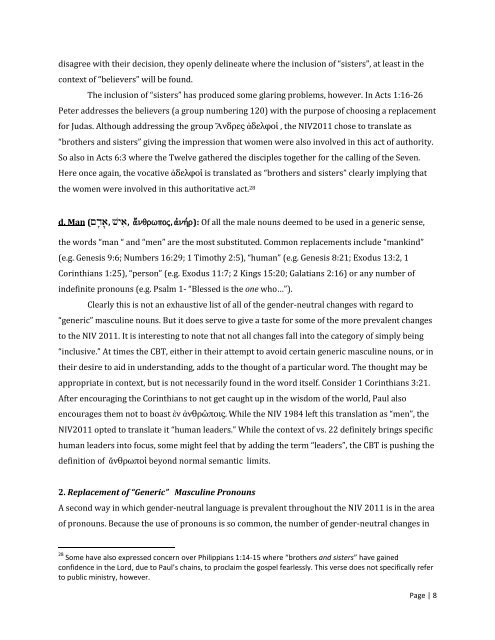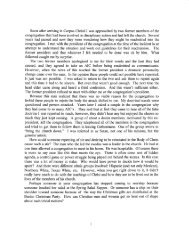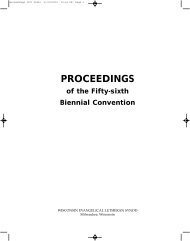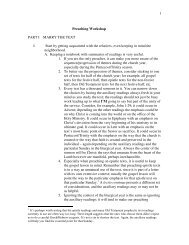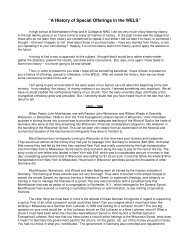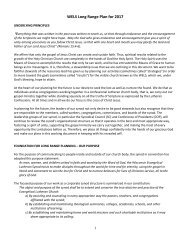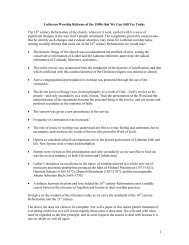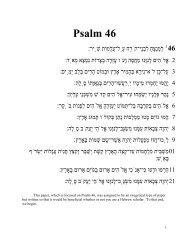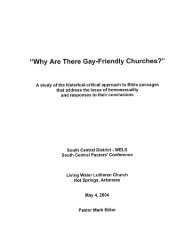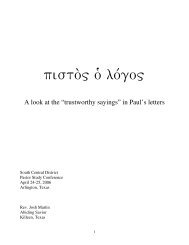A Brief Survey of the NIV 2011 and the Use of Gender-Neutral ...
A Brief Survey of the NIV 2011 and the Use of Gender-Neutral ...
A Brief Survey of the NIV 2011 and the Use of Gender-Neutral ...
You also want an ePaper? Increase the reach of your titles
YUMPU automatically turns print PDFs into web optimized ePapers that Google loves.
disagree with <strong>the</strong>ir decision, <strong>the</strong>y openly delineate where <strong>the</strong> inclusion <strong>of</strong> “sisters”, at least in <strong>the</strong><br />
context <strong>of</strong> “believers” will be found.<br />
The inclusion <strong>of</strong> “sisters” has produced some glaring problems, however. In Acts 1:16-26<br />
Peter addresses <strong>the</strong> believers (a group numbering 120) with <strong>the</strong> purpose <strong>of</strong> choosing a replacement<br />
for Judas. Although addressing <strong>the</strong> group Ἄνδρες ἀδελφοί , <strong>the</strong> <strong>NIV</strong><strong>2011</strong> chose to translate as<br />
“bro<strong>the</strong>rs <strong>and</strong> sisters” giving <strong>the</strong> impression that women were also involved in this act <strong>of</strong> authority.<br />
So also in Acts 6:3 where <strong>the</strong> Twelve ga<strong>the</strong>red <strong>the</strong> disciples toge<strong>the</strong>r for <strong>the</strong> calling <strong>of</strong> <strong>the</strong> Seven.<br />
Here once again, <strong>the</strong> vocative ἀδελφοί is translated as “bro<strong>the</strong>rs <strong>and</strong> sisters” clearly implying that<br />
<strong>the</strong> women were involved in this authoritative act. 28<br />
d. Man (~d'a', vyai, a;nqrwpoj, avnh,r): Of all <strong>the</strong> male nouns deemed to be used in a generic sense,<br />
<strong>the</strong> words “man “ <strong>and</strong> “men” are <strong>the</strong> most substituted. Common replacements include “mankind”<br />
(e.g. Genesis 9:6; Numbers 16:29; 1 Timothy 2:5), “human” (e.g. Genesis 8:21; Exodus 13:2, 1<br />
Corinthians 1:25), “person” (e.g. Exodus 11:7; 2 Kings 15:20; Galatians 2:16) or any number <strong>of</strong><br />
indefinite pronouns (e.g. Psalm 1- “Blessed is <strong>the</strong> one who…”).<br />
Clearly this is not an exhaustive list <strong>of</strong> all <strong>of</strong> <strong>the</strong> gender-neutral changes with regard to<br />
“generic” masculine nouns. But it does serve to give a taste for some <strong>of</strong> <strong>the</strong> more prevalent changes<br />
to <strong>the</strong> <strong>NIV</strong> <strong>2011</strong>. It is interesting to note that not all changes fall into <strong>the</strong> category <strong>of</strong> simply being<br />
“inclusive.” At times <strong>the</strong> CBT, ei<strong>the</strong>r in <strong>the</strong>ir attempt to avoid certain generic masculine nouns, or in<br />
<strong>the</strong>ir desire to aid in underst<strong>and</strong>ing, adds to <strong>the</strong> thought <strong>of</strong> a particular word. The thought may be<br />
appropriate in context, but is not necessarily found in <strong>the</strong> word itself. Consider 1 Corinthians 3:21.<br />
After encouraging <strong>the</strong> Corinthians to not get caught up in <strong>the</strong> wisdom <strong>of</strong> <strong>the</strong> world, Paul also<br />
encourages <strong>the</strong>m not to boast ἐν ἀνθρώποις. While <strong>the</strong> <strong>NIV</strong> 1984 left this translation as “men”, <strong>the</strong><br />
<strong>NIV</strong><strong>2011</strong> opted to translate it “human leaders.” While <strong>the</strong> context <strong>of</strong> vs. 22 definitely brings specific<br />
human leaders into focus, some might feel that by adding <strong>the</strong> term “leaders”, <strong>the</strong> CBT is pushing <strong>the</strong><br />
definition <strong>of</strong> ἄνθρωποί beyond normal semantic limits.<br />
2. Replacement <strong>of</strong> “Generic” Masculine Pronouns<br />
A second way in which gender-neutral language is prevalent throughout <strong>the</strong> <strong>NIV</strong> <strong>2011</strong> is in <strong>the</strong> area<br />
<strong>of</strong> pronouns. Because <strong>the</strong> use <strong>of</strong> pronouns is so common, <strong>the</strong> number <strong>of</strong> gender-neutral changes in<br />
28 Some have also expressed concern over Philippians 1:14-15 where “bro<strong>the</strong>rs <strong>and</strong> sisters” have gained<br />
confidence in <strong>the</strong> Lord, due to Paul’s chains, to proclaim <strong>the</strong> gospel fearlessly. This verse does not specifically refer<br />
to public ministry, however.<br />
Page | 8


